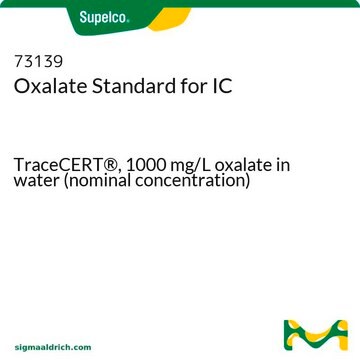223433
Sodium oxalate
ACS reagent, ≥99.5%
Synonym(s):
Ethanedioic acid sodium salt, Oxalic acid disodium salt
About This Item
Recommended Products
grade
ACS reagent
Quality Level
description
neutrality passes test
Assay
≥99.5%
form
powder
impurities
hot H2SO4, passes test (darkened)
≤0.005% insolubles
loss
≤0.01% loss on drying
anion traces
chloride (Cl-): ≤0.002%
sulfate (SO42-): ≤0.002%
cation traces
Fe: ≤0.001%
K: ≤0.005%
NH4+: ≤0.002%
heavy metals (as Pb): ≤0.002%
SMILES string
[Na+].[Na+].[O-]C(=O)C([O-])=O
InChI
1S/C2H2O4.2Na/c3-1(4)2(5)6;;/h(H,3,4)(H,5,6);;/q;2*+1/p-2
InChI key
ZNCPFRVNHGOPAG-UHFFFAOYSA-L
Looking for similar products? Visit Product Comparison Guide
General description
Application
related product
Signal Word
Warning
Hazard Statements
Precautionary Statements
Hazard Classifications
Acute Tox. 4 Dermal - Acute Tox. 4 Oral
Storage Class Code
11 - Combustible Solids
WGK
WGK 1
Flash Point(F)
Not applicable
Flash Point(C)
Not applicable
Regulatory Listings
Regulatory Listings are mainly provided for chemical products. Only limited information can be provided here for non-chemical products. No entry means none of the components are listed. It is the user’s obligation to ensure the safe and legal use of the product.
PDSCL
Deleterious substance
ISHL Indicated Name
Substances Subject to be Indicated Names
ISHL Notified Names
Substances Subject to be Notified Names
JAN Code
223433-BULK:
223433-5G:4548173251226
223433-VAR:
223433-500G:4548173118352
223433-100G:4548173118345
Choose from one of the most recent versions:
Certificates of Analysis (COA)
Don't see the Right Version?
If you require a particular version, you can look up a specific certificate by the Lot or Batch number.
Already Own This Product?
Find documentation for the products that you have recently purchased in the Document Library.
Customers Also Viewed
Our team of scientists has experience in all areas of research including Life Science, Material Science, Chemical Synthesis, Chromatography, Analytical and many others.
Contact Technical Service










